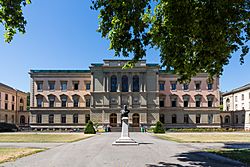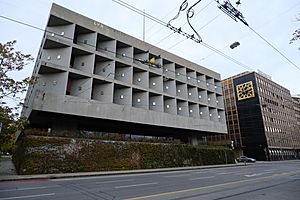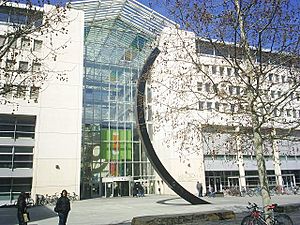University of Geneva facts for kids
|
Université de Genève
|
|
 |
|
| Latin: Schola Genevensis | |
| Motto | Post tenebras lux (Latin) |
|---|---|
|
Motto in English
|
Light after darkness |
| Type | Public university |
| Established | 1559 |
| Rector | Audrey Leuba |
|
Administrative staff
|
approx. 6,500 |
| Students | 17,271 |
| Location |
,
47°22′35″N 8°32′53″E / 47.37639°N 8.54806°E |
| Campus | Urban |
| Language | French English |
| Affiliations | 4EU+ Alliance Coimbra Group LERU EUA IFPU |
| Website | www.unige.ch |
 |
|
The University of Geneva (which in French is Université de Genève) is a public university in Geneva, Switzerland. It was started in 1559 by a French thinker named John Calvin. Back then, it was a school mainly for studying religion.
Over time, it grew and changed. By the 17th century, it became a place for learning about many different subjects. In 1873, it became a non-religious university. In 2009, the university celebrated its 450th birthday! Today, it is the third largest university in Switzerland. Many students, almost 40%, come from over 150 different countries.
The University of Geneva focuses on three main goals: teaching students, doing important research, and helping the community. It is part of several important groups of universities, like the League of European Research Universities.
Contents
History of the University
The university began in 1559 as the Academy of Geneva. John Calvin created it as a school for public education in Geneva. Its first goal was to train religious leaders. But by 1565, it also started teaching Law to prepare people for government roles.
Later, between 1798 and 1813, the school was reorganized. It started offering different degrees and was divided into separate departments called faculties. This helped it become a more modern university. In 1964, Sophie Kanza made history as the first Congolese woman to earn a university degree, which she received from the University of Geneva.
Where the University is Located
The University of Geneva has buildings in different parts of Geneva and in a nearby town called Carouge. Some buildings are quite far from each other. The very first building from 1559, called Collège Calvin, is no longer part of the university.
Classes are held in six main places: Les Bastions, Uni Dufour, Sciences I, II, and III, Uni Mail, Uni Pignon, Centre Médical Universitaire (CMU), and Battelle. There are also other smaller locations.
Uni Bastions: A Historic Spot
Uni Bastions was built between 1868 and 1871. It is a well-known symbol of academic life in Geneva. This building is in the middle of a park and is home to the religious studies and arts departments.
Uni Dufour: Modern Design
The design of Uni Dufour was inspired by a famous architect named Le Corbusier. This building houses the main administration offices of the university.
Uni Mail: A Big Learning Hub
Uni Mail is the largest building in Switzerland dedicated to social sciences. It holds the departments for Law, Economics, Management, Psychology, Education, and Translation and Interpreting.
How the University is Organized
The University of Geneva is made up of different faculties and special centers. These groups handle teaching, research, and community service in various subjects.
University Faculties
The university has nine main faculties:
- Faculty of Sciences
- Faculty of Medicine
- Faculty of Humanities
- Geneva School of Economics and Management (GSEM)
- Geneva School of Social Sciences (G3S)
- Geneva Law School
- Faculty of Theology
- Faculty of Psychology and Education
- Faculty of Translation and Interpreting
Special Research Centers
The university also has fourteen special centers that work across different faculties. Some of these include:
- Institute for Reformation History (about the Protestant Reformation)
- Interfaculty Center for Informatics (about computer science)
- Institute for Environmental Sciences (about the environment and energy policy)
- The Global Studies Institute
- Interfaculty Center of Gerontology (about studying aging)
- Swiss Center for Affective Sciences (about emotions)
Partner Institutions
The university works with other nearby institutions. Students can sometimes take classes at these places. Some partners include:
- Bossey Ecumenical Institute
- Wyss Center for Bio- and Neuro-engineering
- Swiss National Supercomputing Centre
- Art-Law Centre
- Center for Biomedical Imaging (CIBM)
- University Centre of Legal Medicine (CURML)
- The Institute for Work and Health (IST)
Libraries and Publications
University Libraries
The University of Geneva has libraries in four main locations:
- Uni Arve has seven libraries, including those for Anthropology, Computer Science, Mathematics, Environmental Sciences, Astronomy, and Earth Sciences.
- Uni Bastions holds libraries for languages, history, and music.
- Uni CMU has a large collection of medical books and resources.
- Uni Mail focuses on Economics, Social Sciences, Law, Psychology, Translation, European studies, and French as a foreign language. It also has the university's multimedia library.
University Publications
The university publishes two main journals:
- The journal de l'UNIGE comes out every two weeks. It shares news within the university, informs students about research, and lists upcoming events.
- Campus is released monthly. It aims to connect the scientific community with the public and act as a "bridge between science and city."
Academics and Learning
How to Get In and Fees
To study for a bachelor's degree, you usually need a Swiss high school diploma or an equivalent from another country. If your previous studies were not in French, you need to pass a French language test. This test happens in early September and includes speaking, listening, and writing. The tuition fees are CHF 500 per semester.
The Academic Year
The school year at the University of Geneva runs from mid-September to mid-June. It has two semesters. Exams are held at the beginning of January and early June. If students need to retake exams, they can do so in late August and early September.
Before the new school year starts, there are "Welcome Days." These days help new students get to know the city and the university. They also get tips on how to succeed. Student groups also organize fun events like city tours and concerts to celebrate the start of the year.
Degrees and Programs
The University of Geneva follows the Bologna process for its degrees. This means it offers:
- Bachelor's degrees (usually three years)
- Master's degrees (one to two years)
- Doctorates (three to five years)
The university offers over 240 types of diplomas. This includes about 30 bachelor's degrees, 70 master's degrees, and 78 doctorates. It also has more than 200 programs for people who want to continue their education.
Studying Abroad
Students at the University of Geneva can choose to study abroad for a semester or a year. The university has partnerships with many universities around the world. Some of these include Harvard Law School, Trinity College Dublin, University of Oxford, McGill University, Johns Hopkins University, and University of Tokyo.
University Research
The University of Geneva is known for its research in many areas. These include molecular biology, physics, astrophysics, economics, social sciences, psychology, and chemistry.
The university is home to six national research centers. These centers focus on topics like genetics, materials science, emotions, and mental illness. Researchers at the university have made important discoveries, such as the first extrasolar planets found by Michel Mayor and Didier Queloz, and quantum teleportation by Nicolas Gisin.
University Rankings
| University rankings | |
|---|---|
| Global – Overall | |
| ARWU World | 58 (2024) |
| CWUR World | 111 (2024) |
| QS World | =155 (2026) |
| THE World | 183 (2024) |
| USNWR Global | 119 (2024) |
The University of Geneva is often ranked as one of the best universities in the world.
Global Rankings
In 2023, the university was ranked 49th globally by the Shanghai Ranking. It was 125th in the QS ranking and 183rd in the THE ranking. In 2006, Newsweek magazine ranked it 32nd in the world.
Subject Rankings
In molecular biology, the research impact of the university was ranked 4th in Europe by Times Higher Education between 1999 and 2009. In physics, the 2024 Shanghai ranking placed the University of Geneva 3rd in Europe and 15th worldwide.
In 2013, the QS subject ranking placed the university 21st in Pharmacy and 49th in Philosophy. The university was ranked in the world's top 200 for every subject.
Other Rankings
In 2013, the QS ranking also placed the university 24th in the world for having the most international teachers. It was 20th for having the most international students. In 2023, it was ranked the 26th best university in Europe overall.
Student Life
In 2016, there were 16,530 students at the University of Geneva. About 61% of them were female. Around 37% of the students were from other countries, coming from 151 different nations. The university also had 4,449 teachers and staff members.
Sports Activities
The "Bureau des sports" organizes all sports activities at the university. Free sports lessons are offered every day. Students just need to show their student ID to join. The university also has its own championships in sports like basketball, indoor football, rowing, and badminton.
University teams also compete in Swiss university championships for various sports. The university even helps students who are high-level athletes balance their sports careers with their studies.
Student Groups
Alumni UNIGE is a group for former students of the University of Geneva. It helps members connect with thousands of other former students. They also get benefits like discounts and special events. Atout-lettres is a group for literature students. It helps them prepare for jobs and connects them with the working world.
Famous People from the University
Many famous people have studied or taught at the University of Geneva. These include Nobel Prize winners and Fields Medal winners (a top award in mathematics).
The university has been home to 10 Nobel Prize winners, including:
- Norman Angell (Nobel Peace Prize 1933)
- Daniel Bovet (Nobel Prize in Medicine 1957)
- Kofi Annan (Nobel Peace Prize 2001)
- Michel Mayor and Didier Queloz (Nobel Prize in Physics 2019, for discovering planets outside our solar system)
Four Fields Medal winners have also been connected to the university: Vaughan Jones, Stanislav Smirnov, Martin Hairer, and Hugo Duminil-Copin.
- Selected Nobel laureate affiliates of UNIGE
-
Karl Gunnar Myrdal, won the 1974 Nobel Prize in Economic Sciences
-
Werner Arber, won the 1978 Nobel Prize in Physiology or Medicine
-
Edmond H. Fischer, won the 1992 Nobel Prize in Physiology or Medicine
-
Kofi Annan, won the 2001 Nobel Peace Prize
-
Didier Queloz, won the 2019 Nobel Prize in Physics
Notable Scholars and Teachers
- Werner Arber (born 1929)
- Jonathan Barnes (born 1942)
- Roland Barthes (1915–1980)
- Theodore Beza (1519–1605)
- John Calvin (1509–1564)
- Jean-Pierre Eckmann (born 1944)
- Jeanne Hersch (1910–2000)
- Jean Piaget (1896–1980)
- Michel Mayor (born 1942)
- Ferdinand de Saussure (1857–1913)
- Klaus Schwab (born 1938)
- Stanislav Smirnov (born 1970)
- George Steiner (1929–2020)
Notable Former Students
- Henri of Luxembourg
- Astrid de Belgique
- Nora of Liechtenstein
- José Manuel Durão Barroso
- Manolo Blahnik
- Micheline Calmy-Rey
- Ruth Dreifuss
- Jacques Dubochet
- Ian Fleming
- Diane von Fürstenberg
- Martin Hairer
- Sophie Kanza
- Claude Nicollier
- Nasser Mohammed Al-Ahmed Al-Sabah
- Tariq Ramadan
- Hani Ramadan
- Alain Tanner
In Stories and Books
- The famous character James Bond briefly studied at the University of Geneva. His creator, Ian Fleming, also studied there.
See also
 In Spanish: Universidad de Ginebra para niños
In Spanish: Universidad de Ginebra para niños
- List of early modern universities in Europe
- List of Swiss universities by enrollment
- AISTS, the International Academy of Sport Science and Technology
 | Bessie Coleman |
 | Spann Watson |
 | Jill E. Brown |
 | Sherman W. White |








